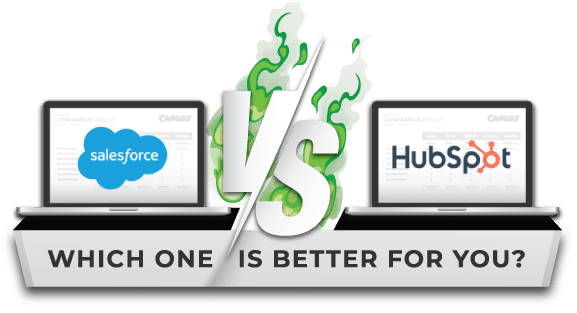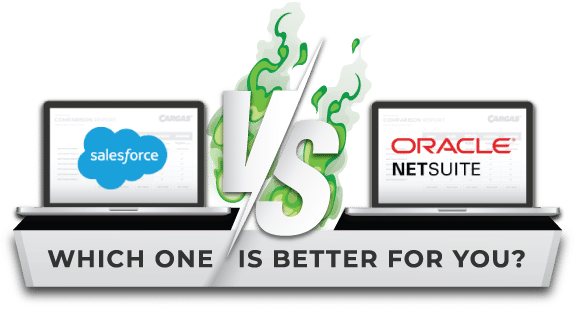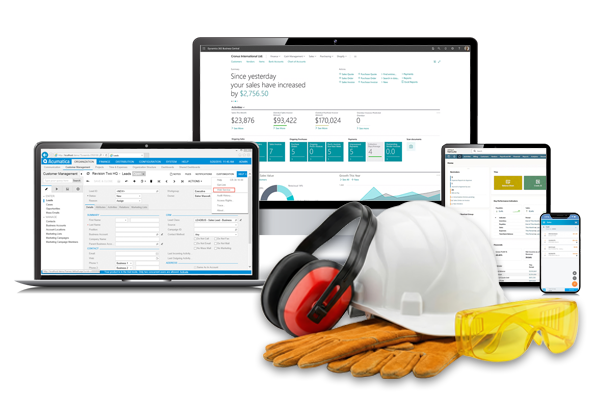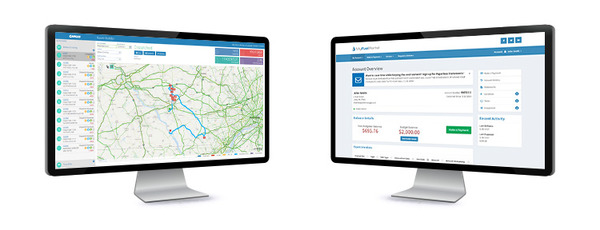SALESFORCE | 7 MIN READ
What Is Salesforce?
The Complete Salesforce Software Guide!

TABLE OF CONTENTS
- Benefits of Salesforce
- Why Businesses Trust Salesforce
- Salesforce Clouds
- How Much Is Salesforce?
- How Does Salesforce Compare?
- Is Salesforce Right for Your Business?
- How to Get Started
- Cargas & Salesforce Partnership
- The 7 Best ERP Software for Manufacturing
- Cargas Acquires Silverline’s MyFuelPortal to Enhance Customer Experience
- What Is Sage Intacct Accounting Software?
Salesforce is customer relationship management (CRM) software designed for sales, marketing, and service teams to manage increasing workloads with less stress. Salesforce comes equipped with all the modules and features you need to attract customers, lead them through the buyer’s journey, and maintain ongoing positive relationships. Read on to discover whether Salesforce—the world’s #1 CRM—is a good fit for your business.
Benefits of Salesforce
Salesforce is designed to be a powerhouse for sales enablement, marketing automation, and customer satisfaction. Despite the variety of organizations that use Salesforce—including companies that differ in size and industry—all Salesforce customers have access to universal benefits:
Why Businesses Trust Salesforce
With more than 150,000 companies on the Salesforce platform, it’s clear Salesforce is a popular software developer. This popularity stems, in part, from the software’s accessibility—it accommodates businesses of all sizes and from all industries with a variety of integrative solutions for sales, marketing, customer service, and more.
Given its popularity, it’s no surprise that Salesforce boasts thousands of four- and five-star reviews on sites like G2. Salesforce Sales Cloud is the most-reviewed module, but Salesforce’s other Clouds maintain high ratings within their niche user bases.
Salesforce’s ROI Dashboard shares some of the top feedback from real Salesforce CRM users, including key stats about the platform’s influence on company performance:
Salesforce Clouds
Salesforce’s modules, which are designed to be deployed on the cloud, are aptly called “Clouds.” Most small and mid-sized businesses may only purchase one Cloud, such as Salesforce Sales Cloud, while large enterprises would benefit from two or more.
Below are four core modules from the Salesforce CRM platform. Keep in mind that each Cloud can be customized with powerful add-ons from Salesforce. To view the entire list of features available through the platform, refer to Salesforce’s complete list of products.
Sales Cloud
Salesforce Sales Cloud is a sales enablement-focused module that includes features for pipeline management, forecasting, and guided selling. With AI capabilities that automate the most redundant sales processes, Sales Cloud makes it easier than ever for your team to turn leads into customers.
Popular Salesforce Sales Cloud Features:
(availability depends on your subscription level)
Service Cloud
Salesforce Service Cloud merges artificial intelligence with human connections to help service teams resolve cases more quickly while maintaining strong relationships with customers. Service Cloud empowers teams to respond to cases in real-time and ensure that resolutions are quick and accurate.
Popular Salesforce Service Cloud Features:
(availability depends on your subscription level)
Marketing Cloud
Salesforce’s various marketing modules can be separated into two distinct types: a multi-channel tool for transactional B2C marketing (Marketing Cloud) and a robust lead management tool for long B2B buying cycles (Account Engagement).
Popular Salesforce Marketing Cloud Features:
(availability depends on your subscription level)
Commerce Cloud
Salesforce Commerce Cloud manages every aspect of ecommerce, including order management, point of sale, and storefront creation. Commerce Cloud’s AI capabilities make B2B and B2C commerce easier than ever with guided shopping features that target the right customers with the right products and services.
Popular Salesforce Commerce Cloud Features:
(availability depends on your subscription level)
How Much Is Salesforce?
Salesforce CRM is a subscription-based platform, so you’ll pay a monthly fee for the software. Pricing varies based on the modules you choose, the subscription level you select for each module, and how many users you require. Salesforce offers discounts on select product bundles that can reduce initial and ongoing investment costs.
The cost of implementing and configuring Salesforce CRM will similarly depend on your selected modules, how much customization you require, and the complexity of integrating Salesforce with your other software systems.
How Does Salesforce Compare?
As you research Salesforce, you may come across comparable CRMs from HubSpot, Microsoft, Oracle, and SAP. While each solution has its strengths and weaknesses, Salesforce stands out among the pack for its customizability and flexibility for multiple industries and business types.
Think of Salesforce like a chameleon, able to integrate seamlessly with third-party solutions of all kinds. Salesforce’s open API makes it easy to customize using existing software integrations and custom-developed modules. Salesforce is a great choice for growing mid-market organizations, but you should answer the following questions to decide whether it will align with your needs:
These and other questions will help you zero in on the right software to help you accomplish your objectives.
Is Salesforce Right for Your Business?
There’s a lot to consider when selecting a new CRM solution for your business. The best way to begin is by exploring your current needs and future goals.
If you answer “yes” to one or more of these questions, Salesforce might be a smart choice for your company:
How to Get Started
If you’re interested in learning more about Salesforce, a dedicated Salesforce partner can answer your questions and guide you through your next steps. Your Salesforce partner will identify your needs, goals, and challenges in detail, so you can feel confident you’re making the best possible business software decision.
As a Salesforce partner, our expert team at Cargas has helped hundreds of businesses just like yours get started with new CRM software. We’ll help you set it up, train your team to use it, offer ongoing support, and customize the platform as your needs evolve. If you’re ready to partner with us, visit our Contact Us page and let us know how we can assist you!
Cargas & Salesforce Partnership
To learn more about Cargas’s expertise in implementing Salesforce and integrating it with other software systems, check out these helpful resources from our blog:

Let’s Chat
Still have questions? Get in touch with our expert team of software professionals.




